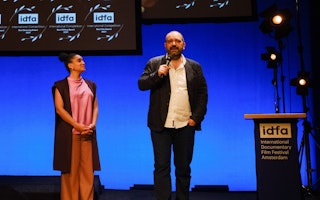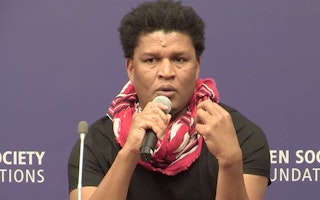Brooklyn Outdoor Exhibit Features Two Open Society Photographers
By Siobhan Riordan

At first, the subjects of Glenna Gordon’s and Brook Singer’s photography appear disjointed: Nigerian romance novelists and polluted industrial sites in the United States.
Yet at Photoville, a free public festival and physical platform for photography from around the world currently taking place in a small “village” of shipping containers on the Brooklyn waterfront, they’re brought together by a shared goal: for visitors to not just see the work, but to engage with it on a deeper level.
Gordon’s project, Diagram of the Heart, features portraits of female Nigerian Muslim romance novelists, offering an intimate look at a world hidden from even most Nigerians. “Everybody knows there are slums in Africa, and there are refugee camps in Africa,” says Gordon. “I don’t want to confirm those ideas. I want to surprise people with something they didn’t know.” Following the installation at Photoville, Gordon’s work will be featured in the Open Society Foundations’ exhibition Moving Walls 23: Journeys this October.
Looked at this way, Gordon’s and Singer’s installations aren’t that different after all, in that they both give viewers a glimpse of something normally unseen. Toxic Sites U.S., an online sharing platform exposing the highly noxious yet often invisible Superfund sites that pockmark the American landscape, takes viewers on a virtual tour of the country’s most egregious industrial pollution using interactive data visualization.
“It’s making visible information like the contaminants of concern, the responsible parties, and the health effects of the contaminants at each site,” says Singer, a 2014 grantee of Open Society’s Documentary Photography Project. “But it’s more than that. The site encourages user participation, or user-generated content, so that anyone can upload photos and links to articles or video, or text description of their experiences at these sites. And so what’s really important is that the official data comingles and is juxtaposed with the individual experience.”
At Photoville, visitors can use Singer’s newly launched website to browse photos and information about the Superfund sites, and also learn more about the demonstrations and events that will be hosted, both at the installation site and beyond, throughout the life of the festival.
Gordon’s immersive exhibit, meanwhile, is meant to put the viewer directly into a Nigerian marketplace where the authors’ books are sold, and will contain the actual romance novels written by the women in her portraits—novels like, Sin is a Puppy That Follows You Home. “I’m excited for this to be a physical entity,” says Gordon. “It’s going to be more than something that you just click through before checking your email and going to your next meeting.”
This interactivity exemplifies the spirit of Photoville, where visitors and the photography community are encouraged to engage with both the people and the work that the festival brings together. Photoville will include a multitude of activities, several of which feature Gordon and Singer, including a panel discussion about influencing social change through photography, a walking tour of the village, and a series of events centered around the Toxic Sites U.S. exhibit.
Until November 2021, Siobhan Riordan was a project lead with Culture and Art at the Open Society Foundations.


